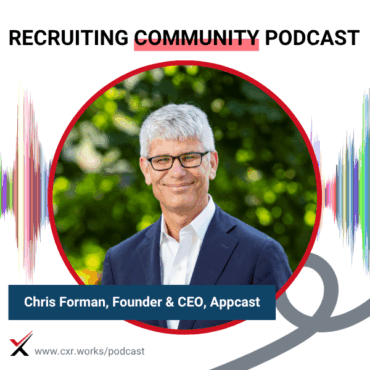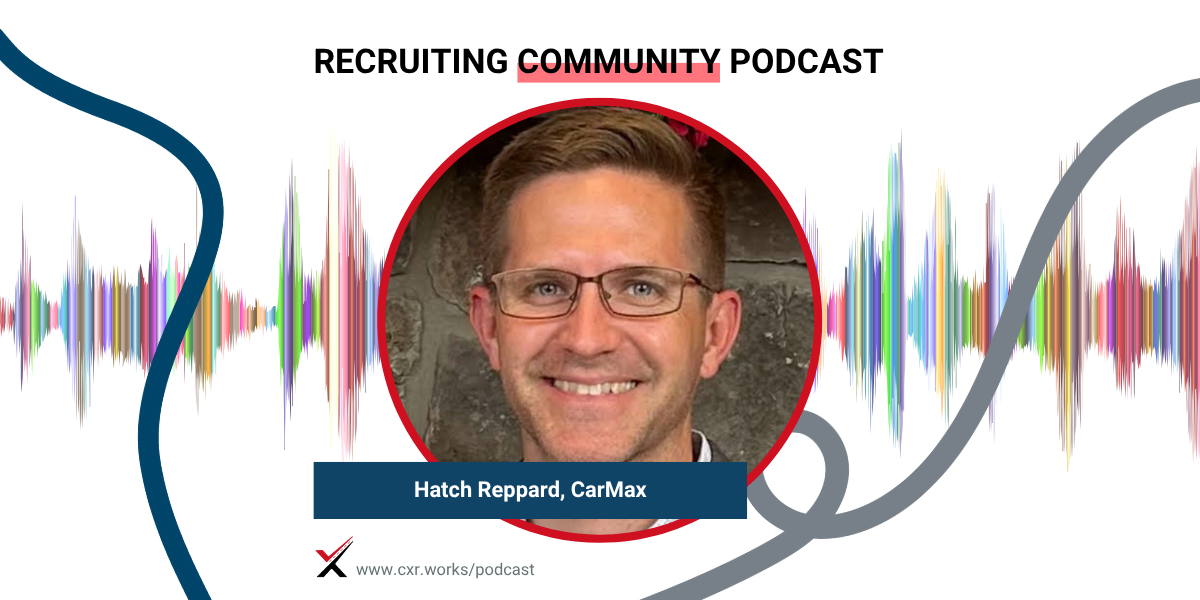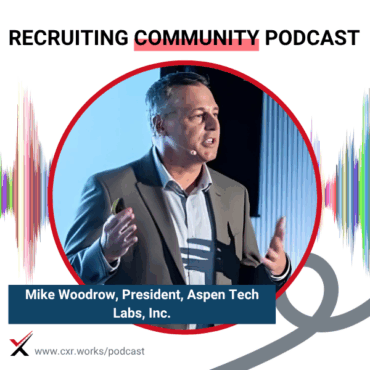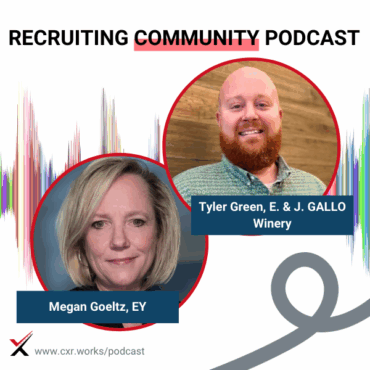
The Hiring Economy
Tariffs, deportations, tax cuts—and breakfast corn dogs? Appcast’s Chris Forman forecasts how political shifts and economic signals will shape TA strategy in 2025.
 play_arrow
play_arrow
Balancing Strategy and Tactics: Melissa Thompson’s Career Crossroads Cami Grace
 play_arrow
play_arrow
Real-Time Jobs Data and the TA Advantage Cami Grace
 play_arrow
play_arrow
20+ Years at Dell and Beyond: Jennifer Newbill’s Career Crossroads Cami Grace
 play_arrow
play_arrow
AI Interview Research Cami Grace

Episode Overview:
In this episode Hatch, a Senior Manager from CarMax, joins CXR to share his insights on the integration of AI tools, ethical considerations, and how candidates and employers navigate AI assistance.
Key Topics Covered:
AI in the Interview Process:
Hatch explains CarMax’s perspective on using AI as a tool for sourcing and initial candidate screening, while emphasizing that they haven’t yet implemented it for comprehensive interview evaluations.
Candidate “Cheating” vs. AI Assistance:
A central theme explores candidates using AI tools to assist with real-time responses during interviews. Hatch points out the ethical challenges in distinguishing between AI-enhanced responses and those genuinely reflective of a candidate’s abilities. He highlights that CarMax’s engineering teams use AI for efficiency but that using AI in interviews can raise fairness questions, especially when candidates rely on it for core problem-solving tasks.
Reconsidering Interview Methods:
A recurring point is the need to adapt interview questions to evaluate critical thinking and rational decision-making rather than just technical answers. The conversation suggest that future interviewing might focus less on raw answers and more on the candidates’ thought processes.
Closing Notes:
In closing, the discussion reflects on a transformative moments in TA, as AI increasingly influences the recruitment landscape. Hatch highlights the ethical concerns surrounding AI in hiring emphasizing the need for a balanced approach, one that combines efficiency with respect for human judgement and skill.
Title:
Candidate Use of AI
Featured Guests:
Hatch Reppard, Senior Manager, Corporate Talent Acquisition, CarMax
Hosts:
Chris Hoyt, President, CareerXroads
Gerry Crispin, Principal and Co-founder, CareerXroads
Episode Overview:
Hatch Reppard from CarMax joins the CXR podcast to examine the nuanced role of AI in interviews—from both the candidate and employer perspectives. As AI tools become more accessible, the conversation explores whether their use is ethical or deceptive, how CarMax approaches these questions internally, and what companies can do to strike the right balance between fairness and innovation in hiring.
Key Topics:
AI interview tools used by candidates and real-time prompt tech
CarMax’s cross-functional committee for AI use and ethics
Company stances on candidate support tools versus recruiter assistance
Defining what constitutes “cheating” in the age of AI
The importance of transparency, boundaries, and candidate expectations
Monitoring tools in assessments and impact on candidate participation
Evolving interview design to test critical thinking over rote responses
Aligning internal culture with external hiring standards
Notable Quotes:
“AI is a tool—like a laptop. It’s not about whether it’s good or bad, it’s how we apply it.” — Hatch Reppard
“Candidates are now using tools that employers have had for years. Is it fair to call that cheating?” — Hatch Reppard
“Our hiring managers said, ‘We want to know who can think critically—not just who can crank out code.’” — Hatch Reppard
“About 30% of candidates refused to complete assessments when we added monitoring.” — Hatch Reppard
“The calculator analogy—AI doesn’t replace understanding. It changes how we engage.” — Chris Hoyt
Takeaways:
As AI becomes more embedded in both candidate and employer processes, organizations must reconsider their definitions of fairness, support, and transparency. CarMax’s thoughtful approach—balancing internal alignment, candidate communication, and hiring culture—offers a model for how TA leaders can address AI’s ethical and operational implications without overcorrecting or falling behind.
Want more conversations like this?
Subscribe to the CXR podcast and explore how top talent leaders are shaping the future of recruiting. Learn more about the CareerXroads community at cxr.works.
Chris Hoyt: This is fun ’cause we’re coming up on the holidays—coming in hot. This is a little bit of a prerecord, but yeah, it feels like people are coming off some travel and getting ready. I have to tell you one of my favorite fun facts—people don’t know this about Jerry Hatch. Ready? Jerry’s family is a huge fan of Christmas. No matter what time of year you visit, if you’re offered coffee—and you always are, he’s a great host—it comes in a Christmas mug. Year-round. This feeds into the theory that he might actually be Santa Claus. But Jerry, what happens to your house after Thanksgiving?
Gerry Crispin: It’s terrible because I have to carry up tons—at one point it was almost 50 huge bins—of Christmas stuff. We don’t hire someone to do it; we do it ourselves. And as we get older, it’s more me doing it to satisfy mostly my wife. I do have a very large extended family, but this is her thing. I still open bins and find price tags because we never used the stuff. She just bought it and put it in there. Now, if you walk around my house, you’ll see 30, 40 different Christmas things kind of off to the side. I try to be subtle about it, but I don’t want to pack them away and bring them back out. So, like those cups, I might as well leave them out all year.
Hatch Reppard: Anything that can double as a year-round decoration or has a pine theme—you’re just leaving it out.
Gerry Crispin: Yeah. I try to be subtle about it, but it’s not so subtle.
Chris Hoyt: That explains that very odd hat rack in your house that looks like a reindeer.
Hatch Reppard: That’s pretty funny. We like Christmas and decorating for the holidays, but I’ve managed to keep a limit on how much stuff we end up with for those same reasons—lots of trips in and out of the attic. Sometimes it feels like by the time you get it all up and organized, it’s time to take it down again. So yeah, leave it out, Jerry. I’m with you.
Chris Hoyt: If only AI could decorate our homes for us. If only. So look, we do have a fun topic today that I want to dive right into. You gentlemen ready?
Gerry Crispin: You bet.
Chris Hoyt: Let’s do it.
Announcer: CXR Channel—our premier podcast for talent acquisition and talent management. Listen in as the CXR community discusses a wide range of topics focused on attracting, engaging, and retaining the best talent. We’re glad you’re here.
Chris Hoyt: All right, welcome everybody to the Recruiting Community podcast. We do weekly insights and updates in the form of a conversation. I’m your host with my co-host—we are Mr. and Mrs. Santa Claus.
Gerry Crispin: I’m not at the North Pole, but there’s no lag time right now and I’m really excited.
Chris Hoyt: Yeah, no tech challenges from the North Pole today.
Gerry Crispin: Yep.
Chris Hoyt: I love it. I’m Chris. This is Jerry. We’re looking forward to talking today with CarMax’s Hatch Reppard on the topic of AI in the interview process—from both the employer’s and the candidate’s side. There’s a lot of talk about candidates cheating, and we’re going to hear how some employers are addressing that—if at all.
A couple quick things—we’re streaming on YouTube, Facebook, LinkedIn, and Twitch. You can check out past and future episodes at cxr.works/podcast. If you’re watching on LinkedIn, there’s a chat window—you can drop comments and we’ll throw them up on screen if we catch them. If you’ve got questions for our guest or for Jerry or myself, you can drop those in too—we try to follow up even after it’s been recorded.
This is an ad-free labor of love. No one pays to be on the show. We bring in folks we think have something cool to say. They have an opinion, they’re showing up, leaning in, doing the work—that’s why they’re here.
One quick thing as we head into the holiday season—the CXR Foundation. If you haven’t already, there’s a QR code on the screen you can scan to donate. The CXR Foundation is a nonprofit we’ve had for about four years now.
Gerry Crispin: Yeah, about that. Took about a year to get the okay from the government on the 501(c)(3).
Chris Hoyt: Yeah, the 501(c)(3), not 401(k)—we’re not giving those away! It took about a year to get it off the ground, but we’re really excited about the work. We’ve got a fantastic board of volunteers helping to make a difference. We’ve given away around $40,000 in scholarships to TA members and their families.
Gerry Crispin: No 401(k) matching!
Chris Hoyt: No 401(k)s. But we’ve done some really great work: history of recruiting, mentoring, interview prep, coaching, community engagement, and more. We’re excited for 2025. If you’re interested in contributing or being part of one of the committees, visit cxrfoundation.org or scan the QR code.
Let’s bring in Hatch. We’ll put you in the big window—sorry, Jerry. Hatch, how are you?
Hatch Reppard: I’m good! I didn’t know we were jumping into Jerry’s financial advising today.
Gerry Crispin: It was a senior moment—I had just gotten off a call with my financial advisor at Chase, so that was in the back of my mind.
Chris Hoyt: Sounds like it was in the front. But that’s okay! Hatch, you’ve been at CarMax for about four years, right? Before that, you were in account services and biz dev at companies like Service Express and People Solutions. But give us your own elevator pitch—who is Hatch and why are we paying attention to you today?
Hatch Reppard: Well, I’m not sure why you’re paying attention to me yet, but I can tell you who I am. I’ve worked in some form of talent acquisition for almost 20 years now, which feels crazy to say. I started in the third-party agency space—did a lot of contract staffing across different industries. After about 10 years, I moved in-house and realized that culture was paramount to me.
I’m based in Richmond, Virginia, and around 2019-2020, I started looking for companies with a reputation for strong culture—and that led me to CarMax. The timing worked out and I joined as senior manager for corporate talent acquisition. I’ve got peers who cover other parts of TA, but I lead corporate. And everything I heard about CarMax being a great place to work—it’s all been true.
Chris Hoyt: It’s all true! Love it. You’ve been a great community champion and always leaning in to help. We were excited to hear you had an opinion on this topic and were willing to share.
Let’s get into it. For context, there are AI solutions now that help candidates answer interview questions in real time. That makes it really hard to capture valid competencies. Most notably, this is a problem in tech roles, but it’s happening across the board.
One of our members mentioned recently that their platform—CodeSignal—flagged 80% of applicants from a particular campus program as potentially cheating. The platform detected copy-pasted answers.
Also, there are GPTs that listen and prompt candidates in real time during interviews. The flip side is that employers have been asking for AI interview coaches for their recruiters—to prompt them in real time. One could argue that’s not so different from what candidates are doing.
So Hatch, let’s start with your stance on AI assistance—for candidates or employers. Should it be off-limits or is it fair game?
Hatch Reppard: The way I think about it is influenced by two ideas. One came up in a CXR conversation: AI and large language models have given candidates tools that used to only be available to employers. For example, some tools let candidates upload their resume and auto-apply to jobs at scale. These are force multipliers that candidates didn’t have before.
So how quickly do we say it’s not fair for candidates to use these tools—if we ourselves would use the same thing?
Chris Hoyt: Interesting. And people assume AI is already screening them out when many companies are still just using basic prescreen questions—something we’ve done for decades.
Hatch Reppard: Exactly. The second framework I consider is: AI is a tool. Like a laptop—you can use it to write your resume or to do something unethical. So it’s not about whether AI is good or bad, it’s about how we apply it.
CarMax created an internal committee with folks from different departments—especially tech—to talk through these ethical and practical implications. Any time we consider an AI-enabled tool in TA, we take it through that group.
Chris Hoyt: So how integrated is AI into CarMax’s interview process? Or is it still early days?
Hatch Reppard: Still early days. The only place we’ve leaned into it is in sourcing—tools like LinkedIn Recruiter and SeekOut have AI-based features that we use. Things like “find me 10 more like this” are helpful. But even those go through our internal review process.
Chris Hoyt: How significant is candidate cheating at CarMax?
Hatch Reppard: I don’t know exact numbers, but it’s become clear it’s pervasive. It started in tech. Hiring managers noticed patterns—like delays in responses, glancing off-screen, or language that sounded like it came from a model.
We had already added a clause to our candidate communications saying that using external assistance, including AI, is not permitted during interviews. But when we asked hiring managers how we should respond, their take surprised me. They said, “We let our engineers use GPT internally, so how can we call this cheating?”
Gerry Crispin: That’s the crux of it: defining “cheating.” If candidates are misusing the tech in a way that’s unethical, that’s one thing. But using it to articulate thoughts better—that’s something else entirely.
Chris Hoyt: And it depends on company culture. If AI is accepted internally, why would you penalize candidates for using it?
Hatch Reppard: Exactly. It’s a cultural question. Do we engage with it and define boundaries? Or do we reject it outright? For instance, in our technical assessments, we used a platform that monitored candidates closely. But about 30% of candidates refused to participate due to those monitoring requests.
Chris Hoyt: Thirty percent?! That’s high.
Hatch Reppard: Yeah. So we adjusted—scaled back the monitoring, and communicated clearly. That balance helped.
When we started seeing repeated, formulaic answers in interviews, our hiring managers said, “What matters most is not who can crank out code—we have AI for that. We want to know who can think critically and explain their choices.”
Chris Hoyt: Exactly. The more AI is involved, the more we need to probe candidates’ reasoning and logic.
Gerry Crispin: And interviewers need to be able to dig past surface-level responses. Eventually, the candidate either knows their stuff or they don’t.
Hatch Reppard: Right. And there’s a difference between using GPT to answer a math problem and using it to fabricate a personal story for a behavioral question. Most candidates feel that ethical line and are hesitant to cross it.
Chris Hoyt: The calculator analogy—AI doesn’t replace the need to understand the work. It just changes how we engage with it.
Hatch Reppard: Exactly.
Chris Hoyt: Alright, we’re about out of time. Hatch, we ask everyone this: if you were going to write a book about this topic and your experience, what would you title it?
Hatch Reppard: This might be a cheap shot, but I’d call it Cheat GPT?—with a question mark.
Chris Hoyt: Oh, that’s good! If we had a soundboard, I’d hit the dad joke button right now.
Hatch Reppard: I actually came prepared with one. My dog ate a bunch of Scrabble tiles, so I had to take him to the vet.
Chris Hoyt: Oh no, is he okay?
Hatch Reppard: No word yet.
Chris Hoyt: That’s excellent. Candidates may cheat, but do you know why skeletons don’t?
Hatch Reppard: No backbone?
Chris Hoyt: Close. They don’t have the guts.
Hatch Reppard: Ha! That’s good.
Chris Hoyt: So who would you give the first signed copy of Cheat GPT? to?
Hatch Reppard: Our head of talent selection—she deals with this stuff daily and is my go-to thought partner.
Chris Hoyt: Love it. Hatch, great to have you on the show. Thanks so much for joining us.
Hatch Reppard: Always fun. Thank you.
Chris Hoyt: We do this weekly—cxr.works/podcast for previous and future episodes. See you next time.
Gerry Crispin: No word yet!
Announcer: Thanks for listening to the CXR channel. Please subscribe to CXR on your favorite podcast resource and leave us a review while you’re at it. Learn more at cxr.works and on social media. We’ll catch you next time.
Tagged as: Artificial Intelligence, Talent Acquisition, Candidate Experience, AI, Podcast, Candidate.
Chris Hoyt is the President of CareerXroads, a global peer community for talent acquisition leaders driving strategic change. With decades of experience leading recruiting innovation at Fortune 500 companies, Chris now advises enterprise TA teams on tech, process, and leadership. He’s a frequent speaker at conferences like SHRM, HR Tech, LinkedIn, and UNLEASH, and he’s known for pushing conversations beyond buzzwords to get to what really works in hiring. Through CXR, he connects top TA professionals to solve real problems, challenge norms, and shape the future of recruiting.

Tariffs, deportations, tax cuts—and breakfast corn dogs? Appcast’s Chris Forman forecasts how political shifts and economic signals will shape TA strategy in 2025.

